Random Reviews: Once & Future (vol. 1): The King is Undead
This volume kicks off a unique take on King Arthur balanced with very human protagonists and modern applications of mythology
—by Nathan on September 16, 2025—
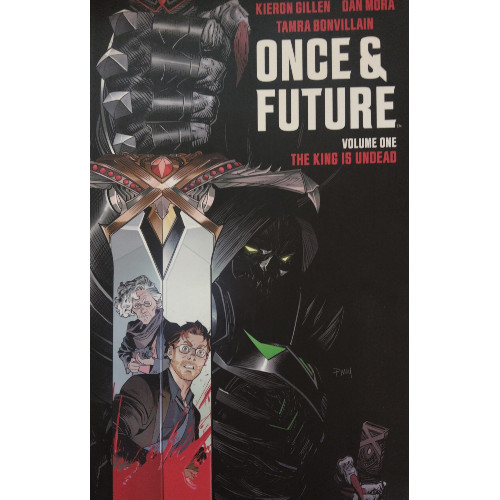
The "comics set in England" train is going a little further, so step with me one more time onto the London Underground to enjoy a story set away from my usual stomping grounds of New York, Metropolis, and Gotham. This was not intentional, admittedly. I just so happened to read this volume around the same time as I read Alan Moore's V for Vendetta, some of Marvel's original Captain Britain comics, and an arc from 2000 AD's "Judge Dredd" serials, and thought it'd be appropriate to round out a series of Brit-centric comics with a review of something more modern.
A while ago, I read Mike Barr and Brian Bolland's Camelot 3000, exploring what could possibly happen if Arthur Pendragon awoke from his fabled slumber in the far-flung future, fighting hordes of marauding aliens with laser guns. This first volume of Kieron Gillen and Dan Mora's series for Boom! Studios asks a similar, two-part question, minus the marauding aliens: what if King Arthur woke up today?
And what if he wasn't on our side?
Once & Future (vol. 1): The King is Undead
Writer: Kieron Gillen
Penciler: Dan Mora
Inker: Dan Mora
Colorist: Tamra Bonvillain
Letterer: Ed Dukeshire
Issues: Once & Future #1-6
Volume Publication Date: March 2020
Issue Publication Dates: August 2019-January 2020
Publisher: Boom! Studios
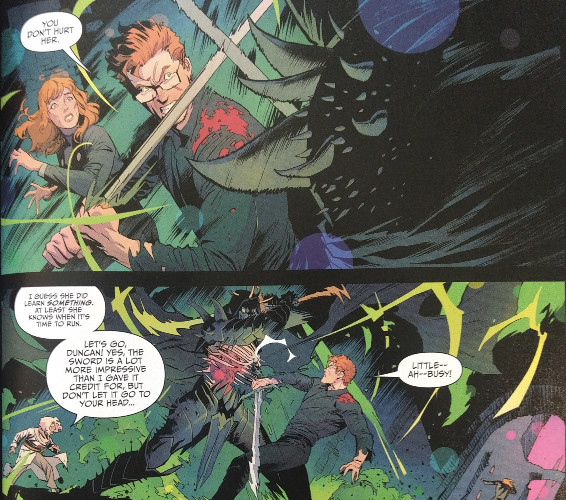
Legends tells that, in England's darkest hour, Arthur will return to unite and rule his people, as he supposedly did so long ago. Gillen and Mora take that in a somewhat different direction by, first, forcing his return to life, and second, by having the Avalon lion of legend be, decidedly, the antagonist of the series. As Once & Future's deuteragonist Bridgette McGuire (affectionately referred to from this point forward as "Gran") tells the protagonist, her grandson Duncan, at the end of the first issue: "Well, [Arthur] could return because it's Britain's darkest hour, sure…or his return could cause it." Just one of those darn, open-ended prophecies, I guess.
In just these six issues, Gillen and Mora find a lot of mileage in the core concept and the characters they craft as this prophecy unfolds. The concept itself, a villainous Arthur, is a new spin on a classic character. The guy's always been cast in a heroic, if not somewhat imperfect, mold. Barr and Bolland's version is my favorite take on the character, a king who knows the undertaking he must pursue to save his beloved country yet who still gives into human emotions of love, jealousy, and anger. Arthur as he's presented here begins as a shambling construct, a boogeyman susceptible to manipulation, but retains at least some emotion. He's a tool, for the moment, of a nationalist organization seeking to align England with how they intend it to be, using Arthur as the means or a weapon to do so. I didn't necessarily sympathize with Arthur–he lashes out in some harsh ways in these issues–but there is a sense he's being used. Yet even some of his personal darkness–shown through a crass comment made about a Frenchman–indicates maybe some twisted nationalistic fervor courses through his reanimated veins which this organization could use.
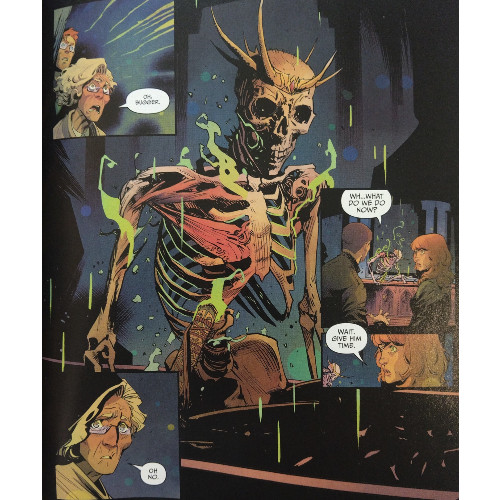
Throughout these issues, Gillen and Mora sew in engaging aspects of Arthurian legend, particularly the idea that concepts of myths can be resurrected in modern form or given a contemporary facelift. The classic elements are here–Merlin, Excalibur, references to Knights of the Round Table–and though Gillen and Mora apply more fantasy than Barr and Bolland did in Camelot 3000, they aptly draw myth into modernity. Gran is more than likely to bring a gun to a sword fight, ending one issue on a cliffhanger where she aims a high-powered sniper rifle at the head of a "reincarnated" Knight of the Round Table. Cops find themselves staring down the figurative barrel of ancient weapons. Duncan himself must come to terms with finding his Gran's stash of guns in the forest and facing down a mythological "questing best" the next.
Gran and Duncan made quite the pair of protagonists; a podcast I listen to made the comparison, somewhat disparagingly, between them and Peter Parker and his Aunt May Parker. The basics are similar, sure: Duncan is a bright young man with glasses who feels concern for his aging female relative, and Gran is an older woman who tuts about her grandson yet possesses a heart of steel and a deep well of bravery. In those ways, I guess, Duncan and Gran are similar to the wondrous Web-Head and his oldest living relative (though Gran is certainly less sexist than Stan Lee's take on May). But those are also tried-and-true qualities to fictional characters, right? The young man brought into a heretofore unknown aspect of his family's life and the older mentor figure who has to invade his obliviousness and teach him how to survive.
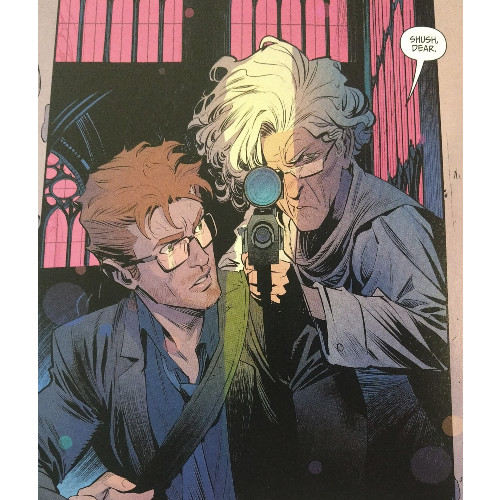
Duncan's obliviousness is part of the character's charm, and Gillen and Mora establish him early as somewhat nebbish, fairly awkward, and klutzy. He spills a drink on a date, awkwardly fights his first monster…guy's out of his depth, but this is the growth we watch him undergo as the narrative develops. He's meant to become more comfortable with the strange, mystical side of existence Gran abruptly yanks him into, especially as he learns to accept how the ongoing legend of King Arthur has affected his family. I expect his story continues in some form in additional volumes, but Gillen and Mora do leave him in a more experienced spot, and I assume we see a more serious side to Duncan as the series progresses.
Gran, conversely, is a spitfire, staying that way through the entire volume. She's got a cache of guns stashed in the forest, uses Duncan to balance her rifle so she can snipe an enemy, thinks nothing of taking a chunk off someone's ear to convince them she's 100% serious. But she cares for Duncan, too, showing that sweet matronly support May often shows Peter…Gran recognizes the need to draw Duncan into her darker side of life, but she isn't unsympathetic, knowing the toll it will take on both of them and anyone else who gets involved.
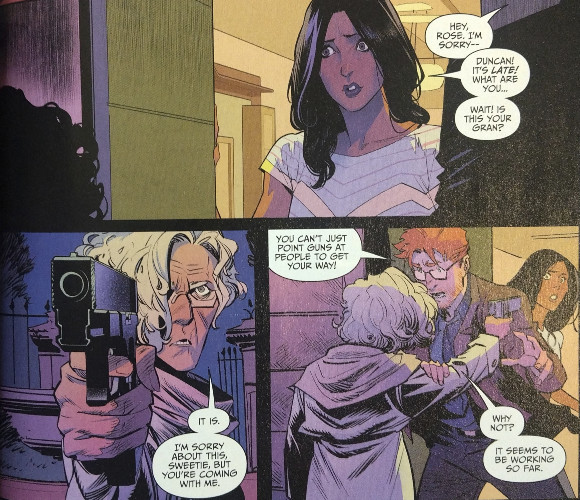
I do wish Gillen and Mora gave more of a sense of Duncan and Gran's past together. We're led to believe Gran raised Duncan, largely on her own, and though the specific circumstances as to why outline themselves by the end of the volume, we don't see how their closeness developed (or how, it's insinuated, that relationship has somewhat frayed as Gran has aged). Maybe this is present in additional volumes, but I wished for more context, maybe some specifics or a flashback showing how the relationship developed between them as Gran raised Duncan.
Interesting as Gillen's plot and characters are, it's Mora who capably brings the ideas to life. I was impressed with the work Mora did with Grant Morrison on Klaus, establishing a Medieval world with a touch of fantasy. Here, Mora is behind a horrifying design for King Arthur and ropes in Medieval legends and monsters to suit the story, from the question beast to undead demon women. Structurally, Mora can whip up a realistic gothic cathedral in one panel and craft a gorgeous otherworldly castle the next. Fans of Klaus will find some similarities between building designs, at least, but will hopefully also enjoy how well Mora combines ancient architecture and mythical monsters with modern clothing, guns, and vehicles. It's a fun blend he captures well on the page.
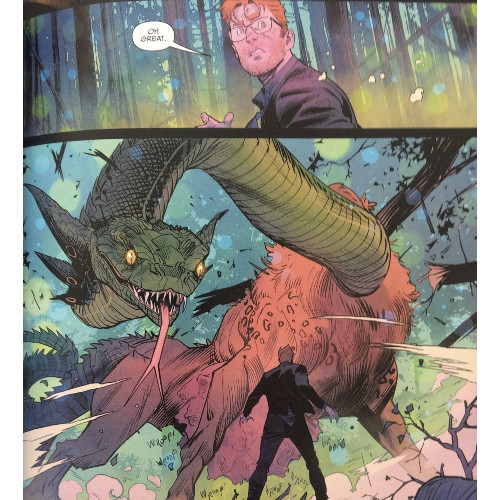
The King is Undead is a fine volume to begin this series. It's a different take on the Arthurian legend, making a monster out of a monarch. Our two protagonists–poor, clumsy Duncan and his grandma–have to contend with villainous nationalists, monsters, and the zombie Arthur himself to prevent whatever madness is being prepared against England and the world. I don't know what direction the series headed in subsequent issues, but should I find other volumes, I won't mind pulling them from the shelf to give them a read…it'll be much easier, if anything, than pulling a fabled sword from a stone.